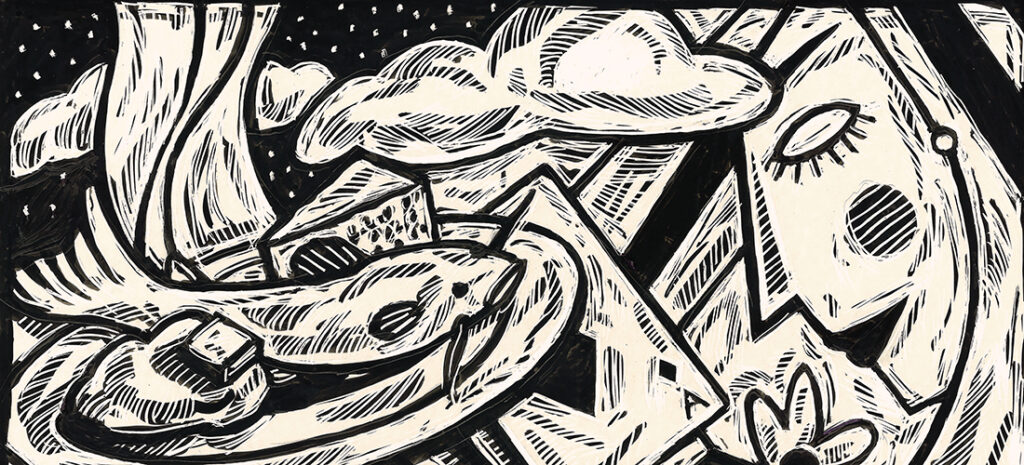Where She Sits

Fiction by Randall Kenan
Illustration by Gary Palmer
 They were in the little dining room off the kitchen when he finally told her. He paced about, motioning with his hands.
They were in the little dining room off the kitchen when he finally told her. He paced about, motioning with his hands.
She just sat there, staring down. Feeling nothing. Maybe. Or just plain tired.
“I can’t do it anymore, Sandra,” he said.
Sandra said nothing. Slowly, she moved her hand over the oilcloth, steadying herself.
“I don’t care what your family says about me,” he said. “I don’t care. I can’t . . . I’m not . . . I’ve got to . . .”
She might have asked Dean about the children. But the idea that he would come up with some sleazy nonsense only made her feel a wave of nausea. Sandra put her head down.
Dean stopped behind her. She could feel the tension in the air; without seeing him, she knew he was clenching and unclenching and clenching his fists. He did that when he was angry. “Did you hear me? I’m leaving.”
Sandra raised her head. “Then go.”
He stood there for the amount of time it takes a frying egg to turn white and walked from the room.
Sandra reached out and caressed the table, and remembered. Not so much remembered as allowed a flood of images, past scents, past sights, to overtake her, fill the void she was now harboring. Each image evoked something like a feeling. So much took place in this room, upon this very surface. Not merely the food served, or the homework fretted over, or the cards played, or the beer spilled, or the puzzles arranged. Moments occurred right here. And now, in this instance of illusions shattered, of dreams wrecked and a heart frozen, these moments seemed to simmer before her, behind her eyes, and she could only hold on to them, to find some strength.
She had inherited this very table from her great-grandmother. Made of pine, by whom she did not know, it had been oiled, dented, dusted, polished, chipped, varnished, battered, peed upon, burned, broken, mended, hammered, nailed, or some such for decades. If it could feel, she knew she’d feel the way it felt now . . .
“Sandra? Damn it! . . . Where is my . . .”
The first true memory of her grandmother had been watching her across this expanse, on the other end, smiling and slicing with pride a piping hot blueberry pie. No, child, wait for it to cool. And so many mornings, days, nights, her mother at that same end: What you doing out so late? Sandra! An A in math! Now that’s good. Girl, don’t you ever raise your voice at me. I’ll knock the taste out your mouth! You heard about Uncle William, didn’t you? . . .
“Sandra, can’t find my . . .”
As if he actually expected her to come in there and help him to pack, to leave; as if any of this fault rested on her shoulders; as if she was expected to go along to get along; as if she would be unreasonable to go into the kitchen, get a butcher’s knife, and chop him into seventeen billion little pieces.
She ran her hand out against it again, against its smooth flatness, as if to absorb some of its stolid solidity.
Here, she served him his first taste of her cooking: catfish, greens, mashed potatoes, corn bread; here, she told her mother she was to wed the man who made her legs feel like overcooked spaghetti and her heart feel like butter. Here, where she tended him, listened to his tales of boring sales meetings and petty office feuds, and where he entertained his buddies (when not in front of the TV); here, where she fed and consoled and interrogated first one, then two daughters; here, where she slowly watched the shoals of her marriage erode, grain by grain.
Oh, if it could talk . . .
“Sandra.” He stood in the door. She didn’t want to look up at him. She had nothing to say.
“Good-bye.”
She did not look up, as he turned, wordless, and walked down the hall. As the door clicked behind him, she held fast. He may go, but some things would remain. A part, a piece, a fixture, a witness. Even now. PS
